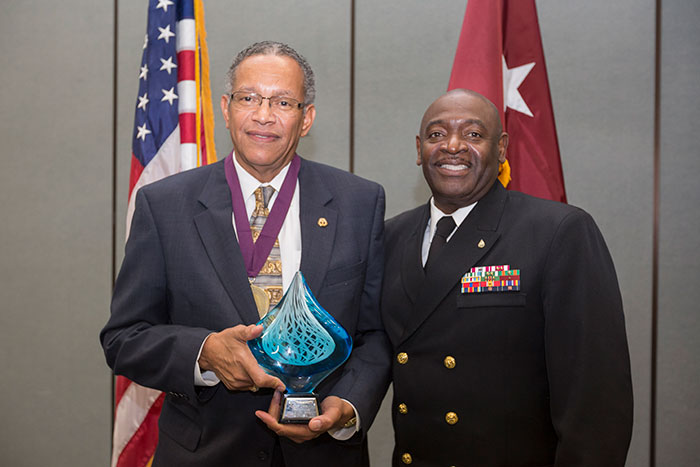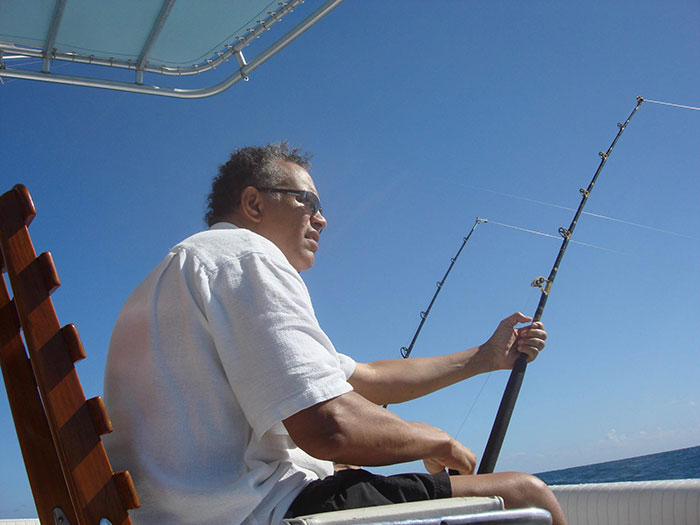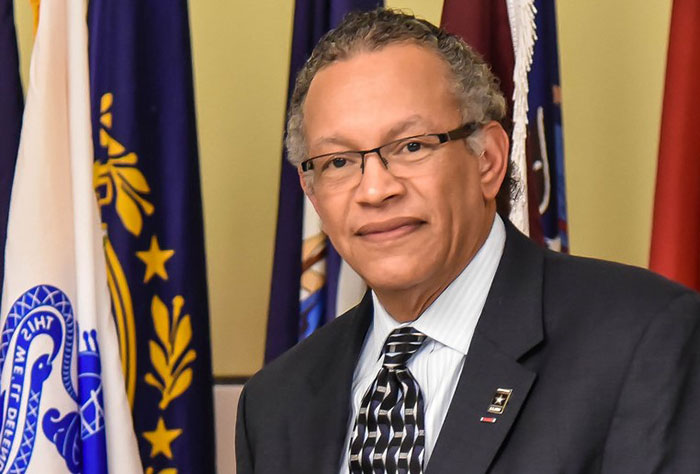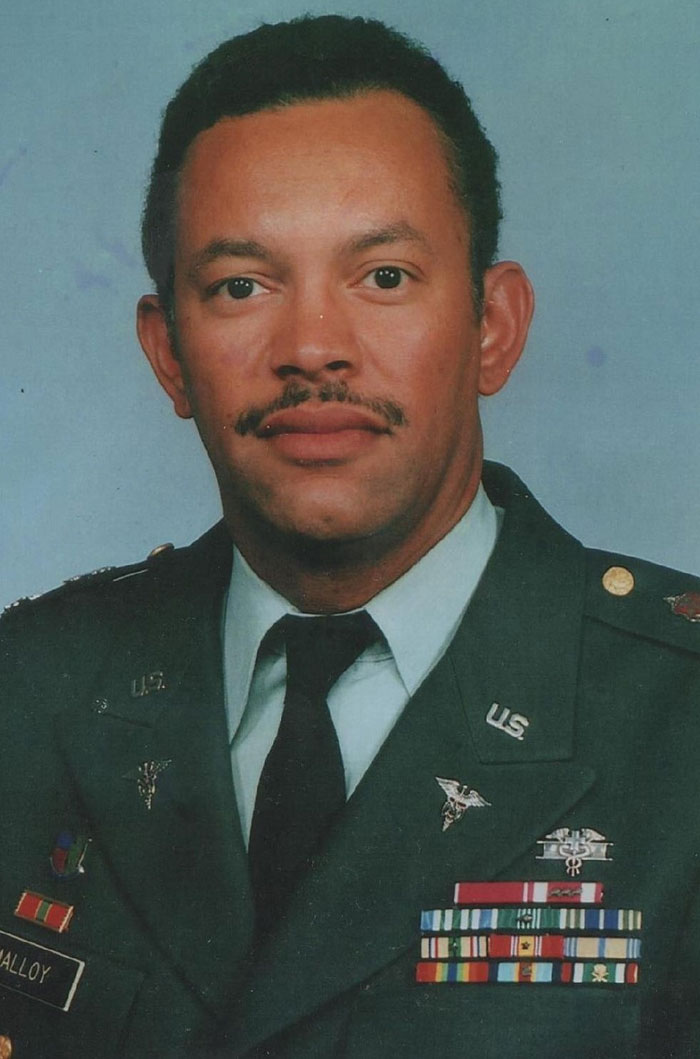From the Farm to the Front Lines, Malloy Reflects on His Career of Science and Service
Growing up on a farm in rural Laurinburg, North Carolina and raising animals and crops, Wilbur Malloy became interested in life science at a young age. He was further inspired by his mother, a nurse at the local community hospital and his high school biology teacher, Mr. McDonald. Summer jobs at the hospital and long chats with Mr. McDonald in the school bio lab laid the groundwork for Malloy to graduate as the Valedictorian of his class and enroll in college. The choices he made there led him to the Army and the fields of healthcare resources management and blood banking and immunohematology. Throughout his career he combined his two passions, science and service. Lieutenant Colonel Malloy retired from the US Army in 1993. And this week he retired from the US Army Medical Research and Development Command's (USAMRDC) Congressionally Directed Medical Research Programs (CDMRP) where he served as a Health Science Program Manager since 2015. Before accepting the position at CDMRP, Malloy served at the Telemedicine and Advanced Technology Research Center (TATRC) for 10 years.
Early Inspiration
"The interest in biology came first, and growing up on my family's farm, there was always interesting biology subject-matter to observe and study to include my activities in the Boy Scouts and Future Farmers of America," Malloy says. His focus on military service was inspired by his father, a World War Two veteran and many of his other relatives who served. Malloy's two pursuits aligned during the Vietnam era.
"The college I attended in North Carolina (NC A&T State University) required all male students to participate in the Reserve Officer Training Courses (ROTC) for the first two years," says Malloy. "The following summer I was drafted for Vietnam and to remain in college I signed an agreement to continue in the Advanced ROTC program which resulted in an Officer Commission at the completion of my undergraduate (biology) degree."
After college, Malloy was commissioned as a Second Lieutenant in the Medical Service Corp. Two years later he was selected to attend the School of Medical Technology affiliated with the Walter Reed Army Medical Center. "This graduate program became my pathway to becoming a Clinical Laboratory Officer (CLO) and Laboratory Manager," says Malloy. "After one assignment as a CLO, I applied for the graduate medical education program in Blood Banking and Immunohematology." He also obtained a Master's degree in Resources Management (Healthcare) while on active duty.
Blood Banker
Malloy became a military Blood Bank Officer/Laboratory Manger in 1976, providing licensed and safe blood products to military medical facilities and deployed forces. His responsibilities also included the recruitment of donors, testing of blood products, manufacturing of blood components, storage and testing under the guidance and regulations of the U.S. Food and Drug Administration.

Malloy's work was instrumental in the early implementation of frozen red blood cells and platelet/plasma apheresis technology and procedures in the US Military. During Operation Desert Storm, he established a frozen blood depot and blood detachment in Saudi Arabia. It was a logistical challenge that required coordination, recruitment of trained personnel, facilities procurement and management under extreme physical and climate conditions.
His 23-year military career took him to Virginia, Texas, Maryland, Georgia, South Korea, California, Germany, and Saudi Arabia. During his final assignment he served as the Laboratory Manager for the Department of Pathology and Area Laboratory Services at Walter Reed Army Medical Center in Washington, DC. He earned the Legion of Merit Award and the Lifetime Achievement Award from the Armed Services Blood Program Office at the Defense Health Agency. Science and circumstances eventually led him to CDMRP.
CDMRP Health Science Program Manager

Malloy drew upon his extensive military experience when he signed on as a health science program manager at CDMRP. He managed research projects with a focus on hemorrhage and resuscitation, improved blood products, prolonged field care, medical devices and prehospital medical solutions in support of the Combat Casualty Care Research Program. He also consulted with his colleagues in the other Joint Program Committees (JPCs), the Joint Warfighter Medical Research Program and the Peer Reviewed Medical Research Program.
According to Malloy, an early focus during Operation Enduring Freedom and Operation Iraqi Freedom (OEF/OIF) was prehospital care and the development of devices, products and technology that could reduce hemorrhage and improve resuscitation from the point of injury to the combat support hospital or first fixed medical treatment facility. His work at CDMRP led to the development of products that made their way to the battlefield.
"Some products of notable mention include blood warmers, reduction of hypothermia devices, improved chest tubes, improved IV solutions, new bandages, gauges and tourniquets, dried plasma, whole blood, cold stored platelets, cryoprecipitate, low titer group O whole blood, manufactured blood products, pathogen reduction of blood products, universal-like blood products research and blood simulants for training purposes, just to name a few," he says.
Looking back on his career, he says he is very satisfied with the work he has done. And upon retirement he and his wife have big plans which include fishing, golfing, gardening, traveling and ancestry research. Before saying goodbye to his friends and colleagues at CDMRP he offered some advice for young professionals.
"Follow your dreams and commitment to your family. Keep your faith and spiritual connection. And to be successful you must have passion and compassion in your chosen profession," he says. "While my early childhood included growing up in the segregated South with vestiges of discrimination and punitive measures against people of color, the military has provided an opportunity for professional development, leadership opportunities, educational benefits, unique travel destinations, and the right set of circumstances to serve this country as a military officer and federal employee."
 An official website of the United States government
An official website of the United States government
 ) or https:// means you've safely connected to the .mil website. Share sensitive information only on official, secure websites.
) or https:// means you've safely connected to the .mil website. Share sensitive information only on official, secure websites.




